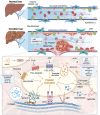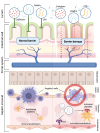The Molecular Mechanisms of Portal Vein Thrombosis in Hepatocellular Carcinoma
- PMID: 39409869
- PMCID: PMC11482560
- DOI: 10.3390/cancers16193247
The Molecular Mechanisms of Portal Vein Thrombosis in Hepatocellular Carcinoma
Abstract
Hepatocellular carcinoma (HCC) represents the sixth most diagnosed cancer worldwide and is the second leading cause of cancer-related death in the world. The association of HCC and portal vein thrombosis (PVT) represents an advanced stage of the tumor. PVT has a prevalence of about 25-50% in HCC, determining poor prognosis and a remarkable reduction in therapeutic perspectives in these patients, leading to severe complications such as ascites, metastasis, an increase in portal hypertension and potentially fatal gastrointestinal bleeding. The aim of this review is to evaluate the molecular mechanisms that are at the basis of PVT development, trying to evaluate possible strategies in the early detection of patients at high risk of PVT.
Keywords: cirrhosis; endothelial disfunction; hepatocellular carcinoma; thrombosis.
Conflict of interest statement
The authors declare no conflicts of interest.
Figures



References
-
- Francoz C., Belghiti J., Vilgrain V., Sommacale D., Paradis V., Condat B., Denninger M.H., Sauvanet A., Valla D., Durand F. Splanchnic vein thrombosis in candidates for liver transplantation: Usefulness of screening and anticoagulation. Gut. 2005;54:691–697. doi: 10.1136/gut.2004.042796. - DOI - PMC - PubMed
Publication types
LinkOut - more resources
Full Text Sources

